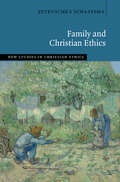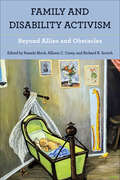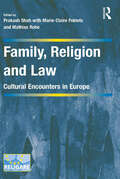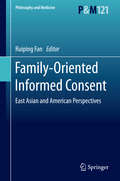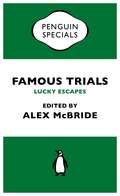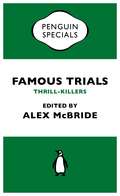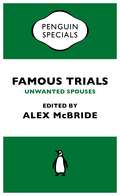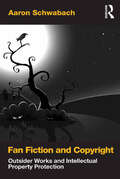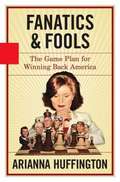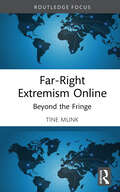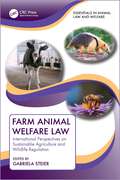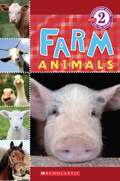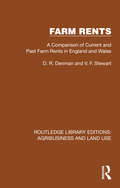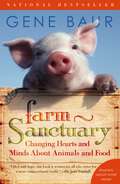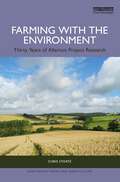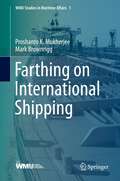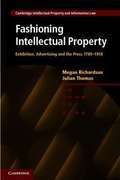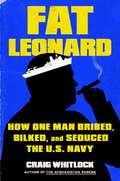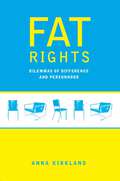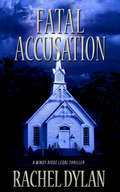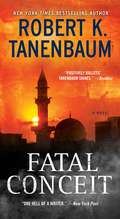- Table View
- List View
Family and Christian Ethics (New Studies in Christian Ethics)
by Petruschka SchaafsmaIn this book, Petruschka Schaafsma offers an innovative appraisal of family. Eschewing the framework of worry and renewal that currently dominates family studies, she instead explores the topic through the concepts of 'givenness' and 'dependence'. 'Givenness' highlights the fact that family is not chosen; 'dependence' refers to being intimately included in each other's identities and lives. Both experiences are challenging, especially in a contemporary context, where independence and freedom to shape one's own life have become accepted ideals. Schaafsma shows the impasses to which these ideals lead in several disciplines – theology, philosophy, sociology, social anthropology and care ethics. She moves constructively beyond them by tapping literary, artistic and biblical sources for their insights on family. Grounded in a theological approach to family as 'mystery' rather than 'problem', she develops an understanding of the current controversial character of family that accounts for both its ordinary and transcendent character.
Family and Disability Activism: Beyond Allies and Obstacles
by Allison C. Carey Pamela Block Richard K. ScotchIn 2020, Pamela Block, Allison C. Carey, and Richard K. Scotch published Allies and Obstacles, which examined the tensions and connections between disability activism and parents of children with disabilities. In Family and Disability Activism, they continue to examine these issues with a focus on the path-breaking advocacy by marginalized activists with intersectional lived experiences. Family and Disability Activism reveals how families and disabled people who identify as BIPOC and/or LGBTQIA2S+ understand issues of rights versus justice. Contributions by Deaf and disabled activists emphasize the frequent need for either care or independence. Other chapters show how members of the disabled community and their families must navigate systemic issues of segregation, institutionalization, and access to special education services differently depending on their ethnic and racial identities. Expanding the conversation about disability, kinship, biological and chosen families, and activism, this volume amplifies important voices in the fight for disability rights. Contributors: Erin Compton, Diane Compton, Jaclyn Ellis, Laura LeBrun Hatcher, Elena Hung, Bridget Liang, Jenelle Rouse, Cheryl Najarian Souza, Jeneva Stone, Roger A. Stone, Lisette E. Torres, Grace Tsao, and the editors
Family and Gender in Renaissance Italy, 1300–1600
by Thomas KuehnThis book studies family life and gender broadly within Italy, not just one region or city, from the fourteenth through the seventeenth centuries. Paternal control of the household was paramount in Italian life at this time, with control of property and even marital choices and career paths laid out for children and carried out from beyond the grave by means of written testaments. However, the reality was always more complex than a simple reading of local laws and legal doctrines would seem to permit, especially when there were no sons to step forward as heirs. Family disputes provided an opening for legal ambiguities to redirect property and endow women with property and means of control. This book uses the decisions of lawyers and judges to examine family dynamics through the lens of law and legal disputes.
Family, Law, and Inheritance in America
by Yvonne PittsYvonne Pitts explores inheritance practices by focusing on nineteenth-century testamentary capacity trials in Kentucky in which disinherited family members challenged relatives' wills. These disappointed heirs claimed that their departed relative lacked the capacity required to write a valid will. These inheritance disputes crisscrossed a variety of legal and cultural terrains, including ordinary people's understandings of what constituted insanity and justice, medical experts' attempts to infuse law with science, and the independence claims of women. Pitts uncovers the contradictions in the body of law that explicitly protected free will while simultaneously reinforcing the primacy of blood in mediating claims to inherited property. By anchoring the study in local communities and the texts of elite jurists, Pitts demonstrates that "capacity" was a term laden with legal meaning and competing communal values about family, race relations, and rationality. These concepts evolved as Kentucky's legal culture mutated as the state transitioned from a conflicted border state with slaves to a developing free-labor, industrializing economy.
Family, Religion and Law: Cultural Encounters in Europe (Cultural Diversity and Law in Association with RELIGARE)
by Prakash Shah Marie-Claire Foblets Mathias RoheThis collection discusses how official legal systems do and should respond to the reality of a plurality of family types and origins within their jurisdictions. It further examines the challenges that arise for practitioners, including lawyers and judges, when faced with such plurality. Focussing on empirical research, the volume presents legal and sociological data of unprecedented comparative depth. It also includes a discussion of how members of minority families respond to the need to organise their legal relationships, and to resolve their disputes in the shadow of official legal systems which differ from those of their familial and communal traditions. The work invites reflection, and demonstrates the urgency and complexity of the questions regarding the search for justice in the field of family life in Europe today.
Family-Oriented Informed Consent
by Ruiping FanThis volume addresses the proper character of patient informed consent to medical treatment and clinical research. The goal is critically to explore the current individually oriented approach to informed consent which grew out of the dominant bioethics movement that arose in the United States in the 1970s. In contrast to that individually oriented approach, this volume explores the importance of family-oriented approaches to informed consent for medical treatment and clinical research. It draws on both East Asian moral resources as well as a critical response to the ways in which the practice of informed consent has developed in the United States
Famous Trials: Lucky Escapes (Penguin Specials)
by Alex McBrideFrom the legendary Famous Trials series of real-life courtroom dramas, two classic murder trials abridged and refreshed as Penguin Specials for modern readers, selected and introduced by Alex McBride, author of Defending the GuiltyNineteen year-old Madeleine Smith may have been charged in 1857 with poisoning her lover, Emile L'Angelier, but her real sin was having sex - a lot of sex - out of wedlock. Her mistake was to write him frank and passionate letters, described by the trial judge as 'without any sense of decency', which L'Angelier threatened to send to her father when she cooled on the idea of marriage, having secretly engaged herself to someone else.Some fifty years later, the trial of Robert Wood, a respectable, hard-working illustrator by day, who frolicked with prostitutes by night, including the unfortunate Emily Dimmock, also hinged on a dangerous correspondence. Dimmock's murderer had evidently ransacked her rooms for a postcard written by Wood. Was there something he was desperate to hide? The author of his trial is certain he was guilty.But both escaped conviction - in Wood's case, thanks to the defence of the best defence barrister in the land. In Madeleine Smith's, the three judges ruled two-to-one to exclude from evidence L'Angelier's pocket book, which recorded her meetings with him on the day of the murder. These two salacious and controversial trials demonstrate how the dramatic difference between 'guilty' and 'not guilty' can sometimes be decided by a mere scrap of paper.The legendary Famous Trials series set the benchmark for historical crime writing with its accounts of the most notorious and intriguing criminal trials of the nineteenth and twentieth centuries. Expertly reconstructed from court transcripts, these often sensational narratives have gripped generations of readers since they first appeared in 1941. In this digital edition, two of the very best Famous Trials have been selected, introduced and further abridged by criminal barrister and author Alex McBride to provide modern readers with the most compelling versions yet of these court-room classics.Alex McBride is a criminal barrister. His book Defending the Guilty: Truth and Lies in the Criminal Courtroom was shortlisted for the 2010 Crime Writers' Association Gold Dagger for Non-Fiction and is available in Penguin. He has written for the Guardian, Independent, Prospect and New Statesman, and has contributed to various BBC programmes, including From Our Own Correspondent.'Expert, authoritative, hilarious - an insider's fearless account of life at the criminal bar' Times Literary Supplement Books of the Year on Defending the Guilty
Famous Trials: Thrill-Killers (Penguin Specials)
by Alex McBrideFrom the legendary Famous Trials series of real-life courtroom dramas, two classic murder trials abridged and refreshed as Penguin Specials for modern readers, selected and introduced by Alex McBride, author of Defending the GuiltyThomas Cream, erstwhile Sunday school teacher and serial poisoner, has an unsettling air and wonky eye. He also happens to be a doctor, which provides him with ample means and an ideal cover for his murderous activities. His victims are vulnerable young women, whose trust he gains with drinks and trips to the music hall, before offering them pills or swigs from a medicine bottle. A few hours later, they are dying in agony.The Honourable Thomas Ley, meanwhile, has an even better disguise: he's the former Justice Minister for New South Wales and a successful businessman, albeit with a shady past. Rumours abound when a political opponent disappears without trace and a business partner winds up at the bottom of a cliff.Neither killer can help themselves - and this, in the end, leads to their downfall - and both defy our comprehension. Brilliantly reconstructed here, their trials, in 1892 and 1947, reveal a deeply sinister conundrum: by the time you've discovered the secrets in their heart, it's inevitably much too late.The legendary Famous Trials series set the benchmark for historical crime writing with its accounts of the most notorious and intriguing criminal trials of the nineteenth and twentieth centuries. Expertly reconstructed from court transcripts, these often sensational narratives have gripped generations of readers since they first appeared in 1941. In this digital edition, two of the very best Famous Trials have been selected, introduced and further abridged by criminal barrister and author Alex McBride to provide modern readers with the most compelling versions yet of these court-room classics.Alex McBride is a criminal barrister. His book Defending the Guilty: Truth and Lies in the Criminal Courtroom was shortlisted for the 2010 Crime Writers' Association Gold Dagger for Non-Fiction and is available in Penguin. He has written for the Guardian, Independent, Prospect and New Statesman, and has contributed to various BBC programmes, including From Our Own Correspondent.'Expert, authoritative, hilarious - an insider's fearless account of life at the criminal bar'Times Literary Supplement Books of the Year on Defending the Guilty
Famous Trials: Unwanted Spouses (Penguin Specials)
by Alex McBrideFrom the legendary Famous Trials series of real-life courtroom dramas, two classic murder trials abridged and refreshed as Penguin Specials for modern readers, selected and introduced by Alex McBride, author of Defending the GuiltyA respectable solicitor in the town of Hay-on-Wye, harried by his troubled wife, slowly and carefully poisons her to death. Pleased with the results, he sees an opportunity for another quick-fix solution and turns his murderous attentions to his business rival... Trapped in a marriage of convenience to an aging man almost thirty years her senior, thirty-eight year-old Alma falls in love with seventeen year-old George, when he answers her advertisement for a 'willing lad' to do the housework. It's the perfect set up - a well-disposed husband and a passionate lover - until George destroys it all by trying to get the husband out of the way...These two classic cases of spousal murder - one chillingly domestic, the other bizarre and touching - took place in 1922 and 1935. In these brilliant reconstructions, they continue to confound our expectations of how murderers are meant to proceed.The legendary Famous Trials series set the benchmark for historical crime writing with its accounts of the most notorious and intriguing criminal trials of the nineteenth and twentieth centuries. Expertly reconstructed from court transcripts, these often sensational narratives have gripped generations of readers since they first appeared in 1941. In this digital edition, two of the very best Famous Trials have been selected, introduced and further abridged by criminal barrister and author Alex McBride to provide modern readers with the most compelling versions yet of these court-room classics.Alex McBride is a criminal barrister. His book Defending the Guilty: Truth and Lies in the Criminal Courtroom was shortlisted for the 2010 Crime Writers' Association Gold Dagger for Non-Fiction and is available in Penguin. He has written for the Guardian, Independent, Prospect and New Statesman, and has contributed to various BBC programmes, including From Our Own Correspondent.'Expert, authoritative, hilarious - an insider's fearless account of life at the criminal bar'Times Literary Supplement Books of the Year on Defending the Guilty
Fan Fiction and Copyright: Outsider Works and Intellectual Property Protection
by Aaron SchwabachAs long as there have been fans, there has been fan fiction. There seems to be a fundamental human need to tell additional stories about the characters after the book, series, play or movie is over. But developments in information technology and copyright law have put these fan stories at risk of collision with the content owners’ intellectual property rights. Fan fiction has long been a nearly invisible form of outsider art, but over the past decade it has grown exponentially in volume and in legal importance. Because of its nature, authorship, and underground status, fan fiction stands at an intersection of key issues regarding property, sexuality, and gender. In Fan Fiction and Copyright, author Aaron Schwabach examines various types of fan-created content and asks whether and to what extent they are protected from liability for copyright infringement. Professor Schwabach discusses examples of original and fan works from a wide range of media, genres, and cultures. From Sherlock Holmes to Harry Potter, fictional characters, their authors, and their fans are sympathetically yet realistically assessed. Fan Fiction and Copyright looks closely at examples of three categories of disputes between authors and their fans: Disputes over the fans’ use of copyrighted characters, disputes over online publication of fiction resembling copyright work, and in the case of J.K. Rowling and a fansite webmaster, a dispute over the compiling of a reference work detailing an author's fictional universe. Offering more thorough coverage of many such controversies than has ever been available elsewhere, and discussing fan works from the United States, Brazil, China, India, Russia, and elsewhere, Fan Fiction and Copyright advances the understanding of fan fiction as transformative use and points the way toward a safe harbor for fan fiction.
Fanatics and Fools: The Game Plan for Winning Back America
by Arianna HuffingtonAs America's leaders fight pre-emptive wars abroad and ordinary Americans fight to keep their heads above water here at home, Arianna Huffington offers a no-holds-barred account of where we stand and a clear and remarkable vision of where we should be headed.
Far-Right Extremism Online: Beyond the Fringe (Routledge Studies in Digital Extremism)
by Tine MunkBy imparting crucial insights into the digital evolution of far-right extremism and its challenges, this book explores how far-right extremism has transformed, utilising digital spaces for communication and employing coded language to evade detection.Far-right extremism has spread extensively across online platforms. Flourishing within echo chambers, these groups propagate different types of online and offline actions and advance their hateful ideologies to a wide-ranging audience. This book highlights the issues surrounding far-right extremism, which distinguishing it from terrorism and examining its contemporary digital manifestations. Importantly, it sheds light on how far-right groups utilise online platforms for communication, radicalisation, and on-ground actions, relying on alternative truths, misinformation, conspiracy theories, fashion, and memes to connect with like-minded individuals. The book also addresses content moderation challenges and the impact of rising populism in today’s political climate, which fuels societal divisions and uncertainty.Far-Right Extremism Online is a valuable resource for academics, students, analysts, and professionals working in counter-extremism, cybersecurity, digital communication, and national security. It is also an indispensable guide for those concerned about far-right extremism in the digital age.
Farm Animal Welfare Law: International Perspectives on Sustainable Agriculture and Wildlife Regulation (Essentials in Animal Law and Welfare)
by Gabriela Steier Sahana Ramdas Christian Mulgrew de Laire Audrey Amescua Amanda G. Verkest Morgan BoutilierThis book introduces the various aspects of international farm animal protection and wildlife conservation through the lenses of food safety and environmental protection law. Bite-sized chapters focus on a wide range of topics from agrobiodiversity, fishing, and aquaculture to pollinators and pesticides, soil management, industrial animal production, and transportation, as well as international food trade. Animal welfare and biodiversity conservation sit at the core of the selected chapters, each one providing real-world examples to make the complex field easy to understand. Current developments including food safety modernization, blockchain, and COVID-19 considerations are addressed head-on. Farm Animal Welfare Law provides a primer for law school courses and masters’ programs, for practitioners, advocates, and animal enthusiasts alike. Through its emphasis on sustainable food production, this book offers a cutting-edge selection of evolving topics at the heart of the pertinent discourse.
Farm Animals (Scholastic Reader Level 2)
by Wade CooperSpend a fact-filled day on a farm in this nonfiction easy reader! Children learn about horses, pigs, cows, geese, sheep, and more. The text is written in easy-to-read rhymes and is illustrated with irresistible photographs. Three pages of fun learning activities are designed to both challenge and entertain new readers. <P><P>Lexile Measure: 470
Farm Policies of the United States, 1790-1950: A Study of Their Origins and Development
by Murray R. BenedictThis volume is an almost essential complement to the new Fund study of the more recent governmental activities in the field of agriculture. Only through a knowledge of their historical roots can come a thorough understanding of present policies and programs.
Farm Rents: A Comparison of Current and Past Farm Rents in England and Wales (Routledge Library Editions: Agribusiness and Land Use #3)
by D. R. Denman V. F. StewartOriginally published in 1959, this post-war study of farm rents marshals the evidence from a nation-wide survey. Not since the National Farm Survey of 1941-3 had similar information about the national average level of farm rents been available. In certain details and aspects of its scope, this study was unique. What was analysed, tabulated and commented upon was of vital importance to the farming and landowning communities, of immediate relevance to professional practice and original in its contribution to academic knowledge. Attention was focussed on the farm rents of England and Wales over the post-war period, but comparison with war-time and pre-war farm rents in Scotland was possible.
Farm Sanctuary: Changing Hearts and Minds About Animals and Food
by Gene BaurLeading animal rights activist Gene Baur examines the real cost of the meat on our plates -- for both humans and animals alike -- in this provocative and thorough examination of the modern farm industry. Many people picture cows, sheep, pigs, and chickens as friendly creatures who live happily within the confines of a peaceful family farm, arriving as food for humans only at the end of their sun-drenched lives. That's what Gene Baur had been told -- but when he first visited a stockyard he realized that this rosy depiction couldn't be more inaccurate. Amid the stench, noise, and filth, his attention was drawn in particular to one sheep who had been cast aside for dead. But as Baur walked by, the sheep raised her head and looked right at him. She was still alive, and the one thing Baur knew for sure that day was that he had to get her to safety. Hilda, as she was later named, was nursed back to health and soon became the first resident of Farm Sanctuary -- an organization dedicated to the rescue, care, and protection of farm animals. The truth is that farm production does not depend on the family farmer with a small herd of animals but instead resembles a large, assembly-line factory. Animals raised for human consumption are confined for the entirety of their lives and often live without companionship, fresh air, or even adequate food and water.Viewed as production units rather than living beings with feelings, ten billion farm animals are exploited specifically for food in the United States every year. In Farm Sanctuary, Baur provides a thoughtprovoking investigation of the ethical questions involved in the production of beef, poultry, pork, milk,and eggs -- and what each of us can do to stop the mistreatment of farm animals and promote compassion. He details the triumphs and the disappointments of more than twenty years on the front lines of the animal protection movement. And he introduces sanctuary. us to some of the special creatures who live at Farm Sanctuary -- from Maya the cow to Marmalade the chicken -- all of whom escaped horrible circumstances to live happier, more peaceful lives. Farm Sanctuary shows how all of us have an opportunity and a responsibility to consume a kinder plate, making a better life for ourselves and animals as well. You will certainly never think of a hamburger or chicken breast the same way after reading this book.
Farming with the Environment: Thirty Years of Allerton Project Research (Earthscan Food and Agriculture)
by Chris StoateThis book examines, discusses and shares over 30 years’ worth of research from the Allerton Project, a research and demonstration farm in the UK which has been carrying out applied interdisciplinary research to explore and explain the need to adapt the management of farmland for environmental protection and to provide public benefits. Designed to provide guidance, feedback and recommendations to farmers, practitioners and policymakers, the Allerton Project is an exceptionally well-documented case study of lowland agricultural land management which has the purpose of meeting multiple objectives. This book draws on the wealth of knowledge built over the past 30 years and unveils and clarifies the complexity of a number of topical debates about current land and wildlife management at a range of spatial scales, explores the underlying historical context and provides some important pointers to future directions of travel. Topics include soil health and management, farmland ecology, development of management practices to enhance biodiversity, natural flood management, water quality and aquatic ecology. Most importantly, the book demonstrates how the findings from this project relate to agricultural and conservation policy more broadly as well as how they are applicable to similar projects throughout Europe. This book will be of great interest to professionals working in agricultural land management and conservation, as well as researchers and students of agri-environmental studies and agricultural policy.
Farthing on International Shipping
by Mark Brownrigg Proshanto K. MukherjeeThe book provides an introduction to shipping in all its aspects. It is a valuable source of information for students of traditional maritime law as well as for those who seek to understand maritime and shipping services on a global scale. The text includes information and analytical content on national and international practices in shipping, including the age-old dichotomy between freedom in international shipping and the persistent demands of states to control specific maritime areas, as well as the tension between, on the one hand, the desire on the part of sovereign states to regulate and protect their shipping interests and, on the other, the abiding concern and unquestioned right of the international community to regulate the global shipping industry effectively, in order to ensure maritime safety, protection of the environment and fair competition.
Fashioning Intellectual Property
by Julian Thomas Megan RichardsonVigorous public debate about intellectual property has a long history. In this assessment of the shifting relationships between the law and the economic, social and cultural sources of creativity and innovation during the long-nineteenth century, Megan Richardson and Julian Thomas examine the 'fashioning' of the law by focusing on emblematic cases, key legislative changes and broader debates. Along the way, the authors highlight how, in 'the age of journalism', the press shaped, and was shaped by, the idea of intellectual property as a protective crucible for improvements in knowledge and progress in the arts and sciences. The engagement in our own time between intellectual property and the creative industries remains volatile and unsettled. As the authors conclude, the fresh opportunities for artistic diversity, expression and communication offered by new media could see the place of intellectual property in the scheme of law being reinvented once again.
Fat Leonard: How One Man Bribed, Bilked, and Seduced the U.S. Navy
by Craig Whitlock#1 New York Times bestselling author Craig Whitlock&’s masterful account of one of the biggest public corruption scandals in American history—exposing how a charismatic Malaysian defense contractor bribed scores of high-ranking military officers, defrauded the US Navy of tens of millions of dollars, and jeopardized our nation&’s security.All the admirals in the US Navy knew Leonard Glenn Francis—either personally or by his legendary reputation. He was the larger-than-life defense contractor who greeted them on the pier whenever they visited ports in Asia, ready to show them a good time after weeks at sea while his company resupplied their ships and submarines. He was famed throughout the fleet for the gluttonous parties he hosted for officers: $1,000-per-person dinners at Asia&’s swankiest restaurants, featuring unlimited Dom Pérignon, Cuban cigars, and sexy young women. On the surface, with his flawless American accent, he seemed like a true friend of the Navy. What the brass didn&’t realize, until far too late, was that Francis had seduced them by exploiting their entitlement and hubris. While he was bribing them with gifts, lavish meals, and booze-fueled orgies, he was making himself obscenely wealthy by bilking American taxpayers. Worse, he was stealing military secrets from under the admirals&’ noses and compromising national security. Based on reams of confidential documents—including the blackmail files that Francis kept on Navy officers—Fat Leonard is the full, unvarnished story of a world-class con man and a captivating testament to the corrosive influence of greed within the ranks of the American military.
Fat Rights: Dilemmas of Difference and Personhood
by Anna KirklandAuthor Interview on The Brian Lehrer ShowAmerica is a weight-obsessed nation. Over the last decade, there's been an explosion of concern in the U.S. about people getting fatter. Plaintiffs are now filing lawsuits arguing that discrimination against fat people should be illegal. Fat Rights asks the first provocative questions that need to be raised about adding weight to lists of currently protected traits like race, gender, and disability. Is body fat an indicator of a character flaw or of incompetence on the job? Does it pose risks or costs to employers they should be allowed to evade? Or is it simply a stigmatized difference that does not bear on the ability to perform most jobs? Could we imagine fatness as part of workplace diversity? Considering fat discrimination prompts us to rethink these basic questions that lawyers, judges, and ordinary citizens ask before a new trait begins to look suitable for antidiscrimination coverage.Fat Rights draws on little-known legal cases brought by fat citizens as well as significant lawsuits over other forms of bodily difference (such as transgenderism), asking why the boundaries of our antidiscrimination laws rest where they do. Fatness, argues Kirkland, is both similar to and provocatively different from other protected traits, raising long–standing dilemmas in antidiscrimination law into stark relief. Though options for defending difference may be scarce, Kirkland evaluates the available strategies and proposes new ways of navigating this new legal question.Fat Rights enters the fray of the obesity debate from a new perspective: our inherited civil rights tradition. The scope is broad, covering much more than just weight discrimination and drawing the reader into the larger context of antidiscrimination protections and how they can be justified for a new group.
Fatal Accusation (Windy Ridge Legal Thriller Ser. #2)
by Rachel DylanA Selah Award Nominated Series Windy Ridge Legal Thriller #2 Attorney Olivia Murray hopes her life will get back to normal after a hard fought trial. But she soon finds out that the forces of evil have not given up their pursuit to win the hearts and minds of those in Windy Ridge. An embezzling scandal breaks that rocks the community church to its core. The New Age groups are ready to declare victory when a high profile prosecutor files criminal charges against the local pastor. However, Olivia is not willing to give up on the community she’s come to love. She takes on the defense pro bono knowing it could destroy her career, but it’s a case that she is called to defend. The battle will be fierce, but she’s not fighting it alone. Her friend and fellow attorney Grant Baxter is by her side. Olivia must use all the tools in her arsenal to combat those who seek to destroy the believers in the community. If Olivia can’t prove the pastor’s innocence, more than her career is on the line. The entire community of Windy Ridge could fall to the forces of darkness.
Fatal Conceit: A Novel (A Butch Karp-Marlene Ciampi Thriller #26)
by Robert K. TanenbaumA CIA chief dies under suspicious circumstances before he can testify about a controversial government cover-up involving a terrorist attack on the US mission in Chechnya. Butch Karp is on the case in this exciting installment to Robert K. Tanenbaum’s bestselling series.When the CIA director is murdered, Butch Karp finds himself battling a heavyweight opponent: the US government. The national presidential election campaign’s foreign policy mantra has been that the terrorists are on the run and Bin Laden is dead. There are rumors that the CIA chief was going to deviate from the administration version of events, and that the government may have had something to do with his death. Can Karp expose the cover-up and find the Chechnyan separatists who aided the Americans at the mission and who have firsthand knowledge of the terrorist attack? Karp must also find his missing daughter, who has been taken hostage by the terrorists. After the New York grand jury indicts the national presidential campaign chairman and the NSA spymaster for the murder of the CIA chief, Karp engages in an unforgettable courtroom confrontation with the defendants who have the full weight of the US administration, a hostile judge, and a compliant media supporting them. These sinister forces will stop at nothing to prevent Karp from bringing out the truth, even if they have to resort to murder.
